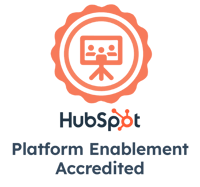I don't know what the future holds, but I do know that marketing is full of change, and that change will only speed up in 2025. There are a few clear trends that sure to dominate - and any serious marketer needs to jump on these trends while they're hot.
Trygve & I recently hosted a webinar about creating a 2025 marketing strategy - you can catch the replay on our YouTube channel. In this article, I want to go more in-depth on the trends we anticipate will be everywhere in 2025.
AI Trends
1. Content creation
Generative AI tools like ChatGPT and Midjourney will continue to get better, faster and easier to use in 2025. You can take advantage of these tools to create quick wins.
Do's:
- Use generative AI text as a jumping-off point for your writing
- Use image generators for lower-importance items (ex. photos inside a PDF or slideshow)
- Use generative AI to brainstorm
Don'ts:
- Just post whatever text an AI generates without reviewing and editing
- Use image generators out of the box with no editing or oversight by a graphic designer for key visual elements - like photos on your website and social media
- Trust that what AI generates is accurate - always verify data
AI is a powerful tool in 2025 - when wielded correctly.
Related Content: 3 Pitfalls to Avoid with AI Content in Marketing
2. Personalized customer experiences
A simple [first name] in an email won't cut it anymore when it comes to personalization. Consumers expect that content "for them" is truly for them. Think about how you engage with the brands you love - are you reading every single email, blog post and web page they publish? Probably not. You're probably only paying attention to information that's relevant to you.
This shift towards hyper-personalized marketing underlines that you can't be all things to all people, and the importance of understanding your target personas.
Related Content: How to Get Better Leads Through Better Inbound Marketing
3. Data-driven decision making
AI can be a great tool for speeding up the research process. One best uses of AI in marketing is creating ideal customer profiles (ICPs) that can help you identify and segment your audience. One of the tools we use and love is Ella from Atomic Elevator. Look for tools like Ella where your unique data is used as a foundation. Trying to do the same work in tools like ChatGPT aren't as effective because AI needs context and guardrails to protect your brand.
SEO Trends
1. AI overviews and zero-click searches
Google's rollout of AI overviews has drastically changed how users interact with search results. Now, they can find the answers to their questions without ever leaving Google. This trend means that simple search queries with direct answers will likely never result in traffic back to your site. Think searches like "what does direct marketing mean?" or "how do I pronounce schadenfreude" that can easily be answered right within the AI overview.
However, more in-depth searches or searches that don't have one concrete answer may still result in clicks back to your site. Google's AI overviews cite sources for their answer, which prompt users to click to the source for more information.
2. Increased traffic to forums
I've been adding "Reddit" to the end of my Google searches for well over a year now. And I'm not the only one. We've seen many people ask the question - "Is Google Dying?"
I don't think Google is dead, but it certainly has changed. People increasingly turn to forums for authentic answers from real people. This started in the B2C world, but we're seeing it more and more in B2B and all facets of online search. To be seen as an authority, you must also be on the forums where your people hang out.
3. Omnichannel SEO
With AI overviews and increased siphoning of traffic away from websites and to forums, your SEO strategy can't just be built with Google in mind. Now, you need to be strategic with each piece of content and optimize accordingly.
It might not be the same optimization for every single thing you produce. Do you want a blog post to be picked up in Google search? Or do you want people to find your post in Reddit search? These two research paths require different tactics.

PPC Trends
1. AI-powered ad creation and optimization
Most major PPC platforms like Google, Meta and LinkedIn now have built-in AI tools for PPC budget recommendations and ad optimization. You should absolutely be using them. AI tools are fantastic for modeling and forecasting, which can help you maximize your budget. They're also useful for refining your ad copy, imagery and targeting.
Like any other AI tool, you still want a human's touch, but AI can help you cut time spent on research.
2. Test Microsoft ads
We saw a huge increase in ads activity on Microsoft's ad platform in 2024, which is projected to keep growing in 2025. B2B brands are seeing success on Microsoft vs. traditional Google ads. It's worth exploring for your brand to see if MS can yield you better-qualified traffic.
3. Using first-party data for precise targeting
2024 was the year of increased online privacy. Google, Apple, and Microsoft have all made major updates to their tools to protect user privacy. The result is that it's harder than ever - and in some cases impossible - to track user activity online.
Now, you need to rely heavily on first-party data. This represents consent freely given - like filling out a form, consenting to cookies and other clear opt-ins from visitors. If you want to dive into first-party tracking, check out our blog: How to Get User Data: Cookieless Targeting in Online Ads.
Social Media Trends
1. Reddit advertising
In the past, many B2B brands waved off Reddit. I urge you to reconsider in 2025. With more traffic to these forum sites, Reddit advertising could be the secret to finding your niche. What's fantastic about Reddit ads is that they allow you to really, really, really narrow in on a niche.
Reddit is a huge ecosystem of many subreddits for darn near any interest or topic, which can make it easy to focus in on your specific audience.
2. Promote in-app shopping with product ads
On the B2C side, don't expect modern consumers to leave their browsing experience to visit your website. Instagram and TikTok both have a robust in-app shopping experience that has only continued to grow in popularity. The easier you make it for your audience to make their purchases, the better.
3. Using first-party data for social ads
One of the advantages of social media is that it gives you a wealth of data that you can use to hone your advertisement. Pay attention to the comments and engagement you receive and similar brands in your niche. What does your audience care about? Where do their interests lie? What language resonates with them?
The saying "jack of all trades, master of none" is relevant here. Don't try to cast a broad net: embrace a niche.
Content Trends
1. Optimizing E-E-A-T signals
Optimizing for Google's E-E-A-T guidelines will be extremely important in 2025. It's important for ranking on Google and other search networks, such as forums. E-E-A-T stands for a series of factors that Google takes into consideration when deciding how to rank content:
- Experience - Firsthand experience with a product, service or methodology. The most common example is reviews.
- Expertise - The credentials and knowledge of the author of a piece of content. A blog from the Mayo Clinic about a disorder will be given more credence in the rankings than a blog from a layperson on the same disorder.
- Authoritativeness - The reputation of the author in their industry. This often goes hand-in-hand with expertise but not necessarily.
- Trustworthiness - The accuracy and transparency of the content itself. This includes compliance with privacy laws on the website itself as well.
These guidelines apply to all content on the internet. They align with how we as individuals might think about a piece of content and the author of it, to boil down to the question - can I trust what this person is saying?
2. Determine search intent
Not all searches are the same, even if similar words are used. There are four primary types of intent:
- Informational intent searches are based on gathering information, both basic and complex. In this type of search, people have a specific question or want to know more about a certain topic. Example: "is pour-over coffee better than drip coffee?"
- Navigational intent searches direct users to a specific website. For example, searching "Facebook" into Google to try and get to Facebook.
- Transactional intent searches are based on retail or eCommerce. These include searches with intent to buy a specific product, like "top hats" or "cheap sunglasses."
- Commercial intent searches are for future purchases. People may know they need a big-ticket item in the future and want to do research online before purchasing. An example is "best game-day TV."
Understanding intent is important for creating your content. You want to use the same topic but in different types of content, aimed at different types of search intent.
Related Content: Why Search Intent Optimization is as Important as SEO
3. Avoid cannibalization
If you're reading this blog, there's a strong possibility that your site has been publishing content for a while now. While adding content to your site is important, too much content around the same topic can cause cannibalization. This is when you have too many pieces of content all speaking about the same topic from the same angle, and you begin to compete with yourself in search rankings, which can cause your website to drop in rankings.
The way around cannibalization is to update and optimize past content that's performing well and is still relevant, vs. creating new pieces of content.

Email Marketing
1. Consent is key
Email marketing communications can be overwhelming. Think about your inbox and how many marketing emails you receive daily. Move away from blasting the same message out to everyone and instead focus on providing content tailored to each person.
In practice, one of the easiest ways to do this is by giving users a choice of types of emails to subscribe to. Maybe they only want information about upcoming events and nothing else. Or maybe they want to see emails with special offers and emails with recent blogs. When they do make this choice, respect their wishes: only send them what they've asked to see.
2. Interactive email content
While there's still a place for traditional emails, interactive emails can be a highly effective way to shake things up and get users to take action. An interactive email lets users get what they need without leaving their inbox. Examples include:
- Embedded videos
- Polls, surveys or quizzes
- Add to cart for e-commerce products
- Image carousels
- Gamification elements (spin the wheel, puzzles)
When experimenting with interactive emails, less is more. Stick to one topic and one interactive element per email. As a note, you'll need to check your options for interactive content for your email marketing client. Some options require a third-party tool for the element to work or coding work.
3. Focus on unique value
Every single email you send should provide value. And no, the value of "this might help me get more business" isn't enough. Why should a subscriber open and engage with your email? What value does it provide to them? Marketing emails can still promote your products or services while being useful and relevant to the recipient.
It's hard to predict what will happen in 2025, but we saw the seeds of these marketing trends planted in 2024. I expect to see them bloom in 2025.
Free Guide: Beginner's Guide to Digital Marketing
This in-depth covers everything you need to know to get started with effective digital marketing
What digital marketing is and how it works.
Explore a step-by-step process for running a digital marketing campaign in today’s competitive business landscape.
Best practices for your digital marketing strategy
We walk through how to implement a strategy using digital marketing, email, SEO, social media and online advertising.
How to measure the impact and ROI of your strategy
Make insights-driven business decisions and confidently present the value and impact of marketing efforts in support of top-level business objectives.
BizzyWeb is a Minneapolis-based digital marketing and web design agency that helps companies get the high-quality leads they need to grow and thrive. Our tactics include inbound marketing, SEO, advertising, web design, content creation and sales automation. We are an accredited HubSpot Diamond Partner and we offer full-service HubSpot onboarding, enablement and strategy for new and current users.







